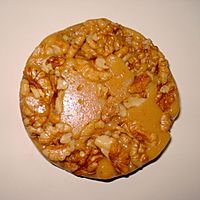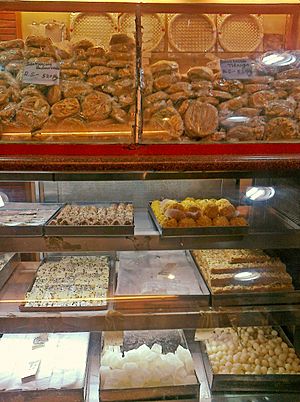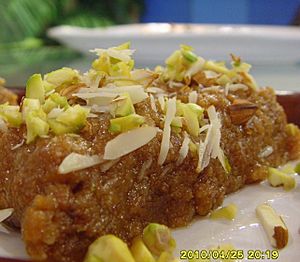Sohan halwa facts for kids

A variation of sohan halwa in the form of a circular disc
|
|
| Course | Dessert |
|---|---|
| Place of origin | West Asia and the Indian subcontinent |
| Main ingredients | cornflour, sugar, milk, water |
| Variations | Almonds |
| Other information | Halva |
Sohan halwa (Urdu سوہن حلوہ) is a yummy, traditional sweet treat from South Asia. It's a type of halwa, which is a thick, sweet dessert. People have loved Sohan halwa since the time of the Mughal Empire. You can find many shops making this sweet in cities like Multan and Dera Ismail Khan in Pakistan, and Old Delhi in India.
Sohan halwa is made by cooking a mix of water, sugar, milk, and cornflour. This mixture is boiled until it becomes solid. Chefs add saffron for a special taste and color. They also use ghee (a type of butter) to stop it from sticking to the pan. To make it even tastier, almonds, pistachios, and cardamom seeds are mixed in. Unlike many other halwa dishes in the Indian subcontinent, Sohan halwa is solid and firm, much like similar sweets from the Middle East.
The Story of Sohan Halwa

In Old Delhi, there was a very old sweet shop called Ghantewala. It opened way back in 1790, when Mughal Emperor Shah Alam II was ruling. This shop was famous for its Sohan halwa and was a popular place to visit. Sadly, after 225 years, the shop closed in 2015 because it wasn't making enough money.
The sweet was first called Sohan in a language called Khariboli (Hindi). The name comes from an old Sanskrit word, "Shobhan." Some people believe the sweet was named after a person called Sohan Lal. This means its name might not be directly linked to the Mughal Empire or Persia (modern-day Iran). Like many other Indian sweets, Sohan halwa also traveled from India to Persia and other places.
How Sohan Halwa is Made for Sale
Sohan halwa has been made by sweet makers for many years. It is often a bit crunchy and has a caramel flavor. It's usually shaped into flat circles, about 5-6 millimeters thick, or cut into small square pieces. You'll often find it sold in fancy metal containers. In recent years, it's also sold in other types of packaging.
 | Valerie Thomas |
 | Frederick McKinley Jones |
 | George Edward Alcorn Jr. |
 | Thomas Mensah |


